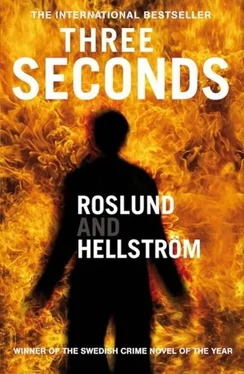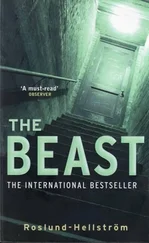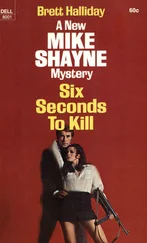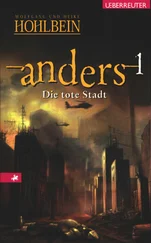"In there?"
He had seen him before. The cleaner in the administration block. He had seemed taller then, more straight-backed, eyes that were curious and alert. The person sitting on the bunk with his knees pulled up under his chin and his back pressed hard to the wall was someone else.
Only death, or fleeing from it, could change someone so quickly. "Is there a problem, Hoffmann?"
The prisoner who couldn't be questioned tried to look more together than he actually was.
"I don't know. What d'you think? Or did you come here to get your trash emptied?"
"I think it would seem so. And that it's you that's causing it. The problem." The order to grant a lawyer access to your unit.
"You asked for voluntary isolation. You refused to say why. And now you've got it, voluntary isolation."
The order that you must not be questioned.
"So… what's your problem?"
"I want to be put in the hole."
"You want what?"
"The hole. Solitary confinement."
I see you.
You're sitting there in the clothes we've issued.
But I don't understand who you are.
"Solitary confinement? Exactly… what exactly are you talking about, Hoffmann?"
"I don't want to have any contact with the other prisoners."
"Are you being threatened?"
"No contact. That's all I'm saying."
Piet Hoffmann looked out through the open door. Prisoners who moved around freely represented death just as much here as in any other unit. They had been moved away from others but not from each other.
"That's not the way it works. Hoffmann, solitary confinement is our decision. It's not something that individual prisoners can decide. You've been moved here on your request, in accordance with Paragraph eighteen. That's our duty. We are under obligation to do that if you request it. But the hole, solitary confinement, has a completely different set of regulations and conditions. Paragraph fifty is not something you can request, it's not voluntary, it is a decision that is enforced. By a principal officer in your unit. Or by me."
They were walking around out there, and they knew. He wouldn't survive the week here.
"Enforced?" "Yes."
"And how the fuck is that decision made?"
"If you're a danger to someone else. Or to yourself."
With walls that locked you in there was nowhere to hide.
"A danger?" "Yes."
"In what way?"
"Violence. Toward fellow prisoners. Or one of us, one of the staff."
They were waiting for him.
They whispered stuka.
He moved closer to the chief warden and looked into a face that crumpled with pain-he had hit him hard.

He sat on the hard concrete floor. He 'd heard talk of solitary confinement cells that were called the hole or the cage, he'd heard tales of people who excelled in violence in the world outside but who had broken after a few days in solitary confinement and were taken to the hospital unit in a fetal position, or those who had quietly hanged themselves with a sheet. A person couldn't be farther removed from life, from what was natural.
He was sitting on the floor as there wasn't a chair. A heavy metal bed and a cement toilet bowl that was solidly attached to the floor. That was it.
He had hit the chief warden in the middle of the face with his fist. The top of the cheek, eye, and nose. Oscarsson had fallen from the chair onto the floor, bleeding but conscious. The guards had rushed in, the governor held his hands in front of his face to protect himself against anything else, and Piet Hoffmann had voluntarily stretched his arms and legs for them to carry him out. The four guards each struggled with a part of his body while the prisoners lined the corridor and watched.
He had survived the attack. He had survived voluntary isolation. He had managed to get here, as much protection as you could get in a closed prison, but he shrank just as he had before, I am alone, no one knows yet, he curled up on the hard surface, freezing then sweating then freezing again. He was still lying there when one of the guards opened the square hatch in the door to ask if he wanted his hour out in the fresh air-an hour a day in a cake slice-shaped cage with blue sky high above the metal mesh-but he shook his head. He didn't want to leave the cell, didn't want to expose himself to anyone.
Lennart Oscarsson closed the door to the voluntary isolation unit and went slowly down the stairs, one at a time, to the ground floor of Block C. One hand to his cheek, his fingertips touching the swelling. It was tender and particularly swollen along the zygomatic bone, and there was a taste of blood on his tongue and in his throat. Give it about an hour, then the area around his eye would turn blue. The chief warden felt physical pain every second from a face that would take a long time to heal, but it meant nothing. It was the other pain, the one from the inside that he felt-all his working life he had lived with men who had no place in real society and he had been proud that he could read difficult people better than anyone, his professional knowledge, the only thing he felt was worth anything anymore.
This punch, he hadn't seen it coming.
He hadn't understood the desperation, hadn't anticipated the force of Hoffmann's fear.
The riot squad had carried him down to where the bastard belonged, and he would stay there for a long time in the shirtiest of shitty cells. Lennart Oscarsson would file a report that afternoon, and a long sentence would become even longer. It didn't help. He felt his tender cheek with his fingers. It didn't change anything, didn't ease his frustration at having misread a prisoner.
The iron bed, the cement toilet. No matter how long he waited, the cell was never going to be more than that. The dirty walls that had once been white, the ceiling that had never been painted, the floor that was so cold. He rang the bell again, kept his finger on the button long enough to irritate them. One of the guards would break in the end and hurry over to tell the prisoner who had assaulted the chief warden to stop ringing the bell or to look forward to days in a straitjacket.
He was cold again.
They knew. He was a snitch, he had a death threat. They would manage to get in here too. It was just a matter of time, as not even a carefully locked cell door could protect him. Wojtek had money and anyone could be bought when death was involved.
The square hatch was some way up the door. It scraped and whined when it was opened.
Staring eyes.
"You want something?"
Who are you?
"I want to make a phone call."
Guard?
'And why should we let you phone?"
Or one of them?
"I want to call the police."
The eye came closer, laughed.
"You want to call the police? And do what? Report that you've just assaulted a prison warden? Those of us who work here don't have much time for that sort of thing."
"None of your fucking business why and you know that. You know that you can't refuse me a phone call to the police."
The eye was silent. The hatch was closed. Steps disappeared.
Piet Hoffmann got up from the cold floor and threw himself over the button on the wall, held it in he guessed for about five minutes.
Suddenly the door was pulled open. Three blue uniforms. The staring eyes that he now was convinced belonged to a guard. Beside him, another one, the same kind. Behind them, a third, with enough stripes for him to be a principal officer, an older man, in his sixties.
He was the one who spoke.
"My name is Martin Jacobson. I'm the principal officer here. Boss in this unit. What's the problem?"
Читать дальше













